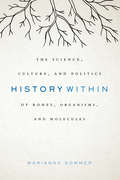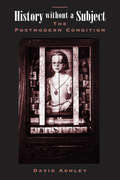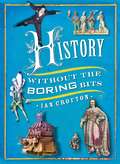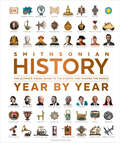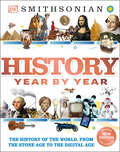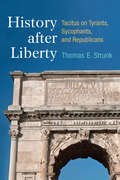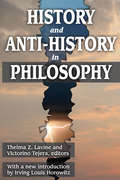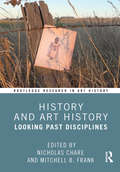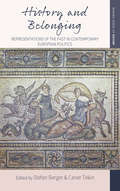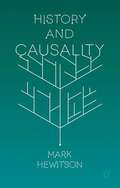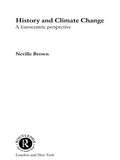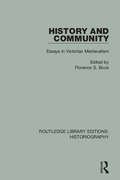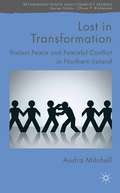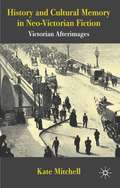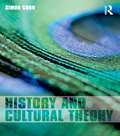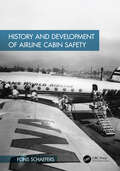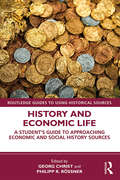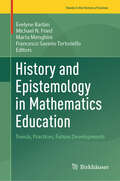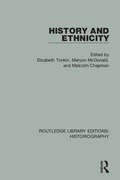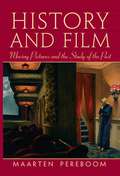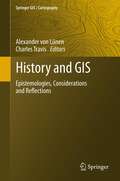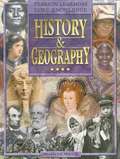- Table View
- List View
History Within: The Science, Culture, and Politics of Bones, Organisms, and Molecules
by Marianne SommerPersonal genomics services such as 23andMe and Ancestry.com now offer what once was science fiction: the ability to sequence and analyze an individual's entire genetic code--promising, in some cases, facts about that individual's ancestry that may have remained otherwise lost. Such services draw on and contribute to the science of human population genetics that attempts to reconstruct the history of humankind, including the origin and movement of specific populations. Is it true, though, that who we are and where we come from is written into the sequence of our genomes? Are genes better documents for determining our histories and identities than fossils or other historical sources? Our interpretation of gene sequences, like our interpretation of other historical evidence, inevitably tells a story laden with political and moral values. Focusing on the work of Henry Fairfield Osborn, Julian Sorell Huxley, and Luigi Luca Cavalli-Sforza in paleoanthropology, evolutionary biology, and human population genetics, History Within asks how the sciences of human origins, whether through the museum, the zoo, or the genetics lab, have shaped our idea of what it means to be human. How have these biologically based histories influenced our ideas about nature, society, and culture? As Marianne Sommer shows, the stories we tell about bones, organisms, and molecules often change the world.
History Without A Subject: The Postmodern Condition
by David AshleyThis book, beginning with an analysis of how changes in the global economy are affecting the lives of ordinary Americans, suggests that the postmodern condition can be likened to the balkanization of culture and society and the "Brazilianization" of politics and the economy.
History Without the Boring Bits
by Ian CroftonConventional chronologies of world history concentrate on the reigns of kings and queens, the dates of battles and treaties, the publication dates of great books, the completion of famous buildings, the deaths of iconic figures, and the years of major discoveries. But there are other more interesting stories to tell--stories that don't usually get into the history books, but which can nevertheless bring the past vividly and excitingly to life.Imagine a history lesson that spares you the details of such seminal events as the 11th-century papal-imperial conflict, that fails to say much at all about the 1815 Congress of Vienna--and that neglects entirely to mention the world-changing moment that was the 1521 Diet of Worms. Imagine instead a book that tells you the date of the ancient Roman law that made it legal to break wind at banquets; the name of the defunct medieval pope whose putrefying corpse was subjected to the humiliation of a trial before a court of law; the identity of the priapic monarch who sired more bastards than any other king of England; and last but not least the date of the demise in London of the first goat to have circumnavigated the globe twice. Imagine a book crammed with such deliciously disposable information, and you have History without the Boring Bits.By turns bizarre, surprising, trivial, and enlightening, History without the Boring Bits offers rich pickings for the browser, and entertainment and inspiration aplenty for those who have grown weary of more conventional works of history.
History Year by Year
by DKGet to grips with history like never before as you travel through the ages in this history encyclopedia for children that stretches from prehistoric times to modern day. Introducing an updated volume of History Year by Year - a timeline of world history that joins the dots of history by putting key historic events across the world on one timeline for children, including everything from prehistoric people, to world wars, humans on the moon, and so much more! Every page is jam-packed pictures and original artefacts, to give children an accurate insight into each era. Including features that explain major events, such as the rise of the Roman Empire of the fall of Communism, in an accessible and easy-to-read manner that doesn&’t talk down to them. DK&’s History Year by Year shows the influences, patterns, and connections between the events that have shaped our world and reveal the history of the world as never before, making this history book for kids an educational must-have volume for children aged 9-12 with a thirst for knowledge, and interest in discovering more about world history. Celebrate your child&’s curiosity as they explore:- Over 1500 images that beautifully illustrates world history for children- Feature spreads look in detail at big themes and stories, such as the Renaissance and the French Revolution, and also include a timeline of events.- &“Child of the Time&” spreads explore the lives of children in history at very different periods, including Ancient Egypt, the Middle Ages, the Industrial Revolution, and World War II.- &“Moment in time&” spreads use one stunning, full-bleed image to capture one moment in history.- Updated timeline spanning prehistoric times up until 2018 Written with kids ages 9 to 12 in mind, this book uses unpretentious language and gives straightforward fun facts. The "Child Of The Time" feature encourages young people to imagine themselves in the past and lets them know that children had a place in history. Older readers will love this engaging educational book too! Dive in and explore the parts of the past you haven't yet discovered. The multitude of photos, maps and graphics make reading about history simple and enjoyable. This visual guide on history for kids provides the reader with an overview of the most fascinating events in history, with concise and bite-sized information. Authorised by the Smithsonian Institution, and featuring an updated timeline documenting recent events in world history that you may still remember happening, there truly is something for every kid to explore, learn and discover.
History Year by Year: The History of the World, from the Stone Age to the Digital Age (DK Children's Year by Year)
by DKGet to grips with history like never before as you travel through the ages in this history encyclopedia for children that stretches from prehistoric times to modern day. Introducing an updated volume of History Year by Year - a timeline of world history that joins the dots of history by putting key historic events across the world on one timeline for children, including everything from prehistoric people, to world wars, humans on the moon, and so much more! Every page is jam-packed pictures and original artefacts, to give children an accurate insight into each era. Including features that explain major events, such as the rise of the Roman Empire of the fall of Communism, in an accessible and easy-to-read manner that doesn&’t talk down to them. DK&’s History Year by Year shows the influences, patterns, and connections between the events that have shaped our world and reveal the history of the world as never before, making this history book for kids an educational must-have volume for children aged 9-12 with a thirst for knowledge, and interest in discovering more about world history. Celebrate your child&’s curiosity as they explore:- Over 1500 images that beautifully illustrates world history for children- Feature spreads look in detail at big themes and stories, such as the Renaissance and the French Revolution, and also include a timeline of events.- &“Child of the Time&” spreads explore the lives of children in history at very different periods, including Ancient Egypt, the Middle Ages, the Industrial Revolution, and World War II.- &“Moment in time&” spreads use one stunning, full-bleed image to capture one moment in history.- Updated timeline spanning prehistoric times up until 2018 Written with kids ages 9 to 12 in mind, this book uses unpretentious language and gives straightforward fun facts. The "Child Of The Time" feature encourages young people to imagine themselves in the past and lets them know that children had a place in history. Older readers will love this engaging educational book too! Dive in and explore the parts of the past you haven't yet discovered. The multitude of photos, maps and graphics make reading about history simple and enjoyable. This visual guide on history for kids provides the reader with an overview of the most fascinating events in history, with concise and bite-sized information. Authorised by the Smithsonian Institution, and featuring an updated timeline documenting recent events in world history that you may still remember happening, there truly is something for every kid to explore, learn and discover.
History after Liberty: Tacitus on Tyrants, Sycophants, and Republicans
by Thomas StrunkRoman historian Tacitus wrote a damning critique of the first century CE Roman empire. The emperors in Tacitus' works are almost universally tyrants surrounded by flatterers and informants, and the image Tacitus creates is of a society that has lost the liberty enjoyed under the Roman Republic. Yet Tacitus also poignantly depicts those who resist this tyranny and seek to restore a sense of liberty to Rome. In his portrayal of autocrats, sycophants, and republicans Tacitus provides an enduring testament to the value of liberty and the evils of despotism. History after Liberty explores Tacitus' political thought through his understanding of liberty. Influenced by modern republican writers such as Quentin Skinner and Philip Pettit, this study defines Tacitean libertas as the freedom from the rule of a dominus and as freedom to participate in the traditional politics of Rome through military service, public service in the senate and magistracies, and public speech. All of these elements are balanced in Tacitus' writings with examples of those resisting the corruption of politics in an effort to restore a sense of free civic engagement. The work concludes with an exploration of Tacitus' own writings as an act of restoring liberty. In contrast to most studies on Tacitus, History after Liberty argues that Tacitus is a republican who writes both to demonstrate that Rome had become a tyranny and to show a way out of that tyranny. History after Liberty addresses the political thought of Tacitus' writings. As such it will be of most interest to those who study the history and historiography of the early Roman empire, namely classicists and ancient historians. The work will also be of use to those interested in the antecedents to modern political thought, particularly the history of republicanism and freedom; readers from this category will include political scientists, philosophers, and modern historians.
History and Anti-History in Philosophy (Nijhoff International Philosophy Ser. #34)
by Thelma Z. Lavine Victorino TejeraHistory and Anti-History in Philosophy demonstrates the viability of the idea of the unity of philosophic thinking and the reflective practice of the history of philosophy. It is a concise in-depth history of the deconstructive turn in philosophy, and of the styles of historical and interpretive contextualization afforded by diverse schools of thought. Thematic unity arises from the focus of contributors on the historical dimension of reflection in philosophy.History of philosophy and intellectual history come together when they are forced to practice foundational analysis, namely, when they feel the need to uncover "indubitables" of society. Indubitables are deeply held, usually unnoticed premises upon which a society or group acts, builds, and speaks. By foundational analysis, the editors do not mean the search for acceptable starting points of intellectual exploration, but the ongoing criticism of all such postulates of faith.For those interested in contextual analysis of Kant, Hegel, Marx, Dewey, Mannheim, Husserl, Dilthey, Heidegger, and Gadamer, this is an invaluable guide. The editors make plain their belief that not using history, as have past philosophies, is unphilosophic ideas in personal construction to a text that cannot supply reasons for being taken seriously in history. This volume illuminates the achievements of present-day social science insights. It merits a close reading by those for whom the history of ideas is a living entity.
History and Art History: Looking Past Disciplines (Routledge Research in Art History)
by Edited by Nicholas Chare and Mitchell B. FrankThrough a series of cross-disciplinary and interdisciplinary interventions, leading international scholars of history and art history explore ways in which the study of images enhances knowledge of the past and informs our understanding of the present. Spanning a diverse range of time periods and places, the contributions cumulatively showcase ways in which ongoing dialogue between history and art history raises important aesthetic, ethical and political questions for the disciplines. The volume fosters a methodological awareness that enriches exchanges across these distinct fields of knowledge. This innovative book will be of interest to scholars in art history, cultural studies, history, visual culture and historiography.
History and Belonging: Representations of the Past in Contemporary European Politics (Making Sense of History #33)
by Stefan Berger Caner TekinIn cultural and intellectual terms, one of the EU’s most important objectives in pursuing unification has been to develop a common historical narrative of Europe. Across ten compelling case studies, this volume examines the premises underlying such a project to ask: Could such an uncontested history of Europe ever exist? Combining studies of national politics, supranational institutions, and the fraught EU-Mideast periphery with a particular focus on the twentieth century, the contributors to History and Belonging offer a fascinating survey of the attempt to forge a post-national identity politics.
History and Belonging: Representations of the Past in Contemporary European Politics (Making Sense of History)
by Stefan Berger and Caner TekinIn cultural and intellectual terms, one of the EU’s most important objectives in pursuing unification has been to develop a common historical narrative of Europe. Across ten compelling case studies, this volume examines the premises underlying such a project to ask: Could such an uncontested history of Europe ever exist? Combining studies of national politics, supranational institutions, and the fraught EU-Mideast periphery with a particular focus on the twentieth century, the contributors to History and Belonging offer a fascinating survey of the attempt to forge a post-national identity politics.
History and Causality
by Mark HewitsonThis volume investigates the different attitudes of historians and other social scientists to questions of causality. It argues that historical theorists after the linguistic turn have paid surprisingly little attention to causes in spite of the centrality of causation in many contemporary works of history. Such neglect or criticism of causality in history on a theoretical level contrasts with persisting interest in causal analysis in sociology, political science, international relations and economics; historians have criticised these disciplines for searching in vain for quantitative proofs, probabilities and covering laws. Hewitson demonstrates, through a critical analysis of a series of overlapping linguistic, cultural and post-colonial 'turns', the extent to which intellectual, social, cultural and other historians have come to renounce the very idea of causality. It uncovers the nexus between the formulation of questions, selection of evidence, use of comparison and counterfactuals, and the refinement of theories, all of which are necessary for description and narrative.
History and Climate Change: A Eurocentric Perspective (Routledge Studies in Physical Geography and Environment)
by Neville BrownHistory and Climate Change is a balanced and comprehensive overview of the links between climate and man's advance from early to modern times. It draws upon demographic, economic, urban, religious and military perspectives. It is a synthesis of the many historical and scientific theories, which have arisen regarding man's progress through the ages.Central to the book is the question of whether climate variation is a fundamental trigger mechanism from which other historical sequences develop, or one amongst a number of other factors, decisive only when a regime/society is poised for change. Evidence for prolonged climate change is not that extensive. But it is clear that climatic variation has regularly played a part in historical development. Paricular attention is here paid to Europe since AD 211.Cold and warmth, wetness and aridity can create contrary reactions within societies, which can be interpreted in vary different ways by scholars from differenct disciplines. Does climate change exacerbate famine and epidemics? Did climate fluctuation play a part in pivotal historical events such as the mass exodus of Hsuing-nu from China, the pressure of the Huns on the Romans and the genesis of the Crusades? Did the bitter Finnish winter of 1939-40 ensure the ultimate defeat of Hitler? These episodes, and many others are discussed throughout the book in the authors distinctive style, with maps and photographs to illustrate the examples given.
History and Community: Essays in Victorian Medievalism (Routledge Library Editions: Historiography)
by Florence S. BoosThe essays in this volume, originally published in 1992, examine some of the pervasive implications of Victorian medievalism, and assess its creative manifestations and dual capacities for expression of reformist anger and escapist retreat. Some of the emotional and intllectual reasons for the strong Victorian attraction to ‘medieval’ history and litereature are discussed and emblematic responses to this attraction are examined.
History and Cultural Memory in Neo-Victorian Fiction
by Kate MitchellPeace interventions can promote violence, whilst conflict may be a crucial means for constraining and preventing it. This book explores these statements, re-thinking the relationships between peace, conflict and violence. From this perspective it reinterprets several phenomena that challenge the 'peace process' in Northern Ireland.
History and Cultural Memory in Neo-Victorian Fiction: Victorian Afterimages
by Kate MitchellArguing that neo-Victorian fiction enacts and celebrates cultural memory, this book uses memory discourse to position these novels as dynamic participants in the contemporary historical imaginary.
History and Cultural Theory
by Simon GunnIn recent times there has been recognition of the growing influence of cultural theory on historical writing. Foucault, Bourdieu, Butler and Spivak are just some of the thinkers whose ideas have been taken up and deployed by historians. What are these ideas and where do they come from? How have cultural theorists thought about 'history'? And how have historians applied theoretical insights to enhance their own understanding of events in the past? This book provides a wide-ranging and authoritative guide to the often vexed and controversial relationship between history and contemporary theory. It analyses the concepts that concern both theorists and historians, such as power, identity, modernity and postcolonialism, and offers a critical evaluation of them from an historical standpoint. Written in an accessible manner, History and Cultural Theory gives historians and students an invaluable summary of the impact of cultural theory on historiography over the last twenty years, and indicates the likely directions of the subject in the future.
History and Development of Airline Cabin Safety
by Fons SchaefersHistory and Development of Airline Cabin Safety offers an understanding of how cabin safety evolved over time. It covers six key areas: impact protection, fire protection, egress potential, life support equipment, information and instructions, and cabin professionals.Exploring the organic choreography of accidents, research, technological progress, rulemaking, and industry response, the book clarifies that cabin safety enhancements were not well planned but came incidentally and step by step. Each step was triggered by accidents with survivability issues, except in one area where a proactive approach proved to be first time right: oxygen for passengers. The step improvements, which mainly occurred in the U.S., concentrated in three waves centered around 1950, 1970, and 1985, respectively.The book will interest aviation regulators, aircraft manufacturers and operators, cabin safety professionals (including cabin crew), and accident investigation professionals.
History and Economic Life: A Student’s Guide to Approaching Economic and Social History Sources (Routledge Guides to Using Historical Sources)
by Philipp R. Rössner Georg ChristHistory and Economic Life offers students a wide-ranging introduction to both quantitative and qualitative approaches to interpreting economic history sources from the Middle Ages to the Twentieth Century. Having identified an ever-widening gap between the use of qualitative sources by cultural historians and quantitative sources by economic historians, the book aims to bridge the divide by making economic history sources more accessible to students and the wider public, and highlighting the need for a complementary rather than exclusive approach. Divided into two parts, the book begins by equipping students with a toolbox to approach economic history sources, considering the range of sources that might be of use and introducing different ways of approaching them. The second part consists of case studies that examine how economic historians use such sources, helping readers to gain a sense of context and understanding of how these sources can be used. The book thereby sheds light on important debates both within and beyond the field, and highlights the benefits gained when combining qualitative and quantitative approaches to source analysis. Introducing sources often avoided in culturally-minded history or statistically-minded economic history courses respectively, and advocating a combined quantitative and qualitative approach, it is an essential resource for students undertaking source analysis within the field.
History and Epistemology in Mathematics Education: Trends, Practices, Future Developments (Trends in the History of Science)
by Michael N. Fried Évelyne Barbin Marta Menghini Francesco Saverio TortorielloThis book explores the evolving relationship between the history and epistemology of mathematics and mathematics education over the past fifty years. Beginning with the international movement that emerged in the 1970s, it celebrates the enduring and expanding role of historical and epistemological perspectives in shaping teaching practices. Organized into seven thematic sections, the volume examines core issues such as how historical and epistemological insights enhance understanding of mathematical concepts, interdisciplinarity as a tool for teaching, and innovative approaches to teacher training. It also delves into the use of historical problems, ancient texts, and textbooks as teaching resources, alongside an analysis of the social and political dimensions of mathematics education. Special attention is given to the impact of the "modern mathematics" reform and its legacy in rekindling interest in the history of mathematics in education. Featuring contributions from diverse geographical and historical contexts, this book is an essential resource for teachers, researchers, and anyone passionate about the rich interplay of history, epistemology, and mathematics.
History and Ethnicity (Routledge Library Editions: Historiography)
by Maryon Mcdonald Elizabeth Tonkin Malcolm ChapmanThese essays examine the importance of historical consicousness and the role of historiography in ‘ethnic’ situations, exploring the many ways in which ethnic groups select history, write or rewrite it, rescue appropriate or ignore it, forget or traduce it. Drawing on expert knowledge of regions ranging from the Amazon to contemporary Germany, the contributors bring anthropological and historical understanding to answer these questions, and investigate major topics such as the relationship between ethnic, national and state identifications, and the cultural work of creating them. Examples include Afrikaaners and Northern Ireland Protestants, as well as Mormons and Catalans. Bringing together a variety of themes that have recently become the focus of study – ethnicity, the uses and nature of history and the likelihood of objectivity in historical telling – the book will be of great interest ot students in the social sciences, anthropology, politics, history and international relations.
History and Family Traditions in England and the Continent, 1000-1200 (Variorum Collected Studies)
by E.M.C. van HoutsThe Normans in France and England left a rich legacy in historiography and literature, which is the subject of this volume. Dr van Houts first deals with the Scandinavian inheritance, which together with contacts with Danish England and Byzantium led to an interesting mix of pagan and ecclesiastical themes. Next she analyses the propaganda that followed the Norman conquest of England, in which the panegyrics written by French clerks eager to gain favour contrast markedly with the almost unanimous condemnation of William’s actions on the Continent. Included is the earliest history of the battle of Hastings written in England, here published with a new English translation. The last papers consider the role of women in the transmission of knowledge about the past: in their families they passed on memories, and their importance as commissioners, readers and informants of chroniclers must also not be underestimated.
History and Film: Moving Pictures and the Study of the Past
by Maarten PereboomThe ability to view recorded moving pictures has had a major impact on human culture since the development of the necessary technologies over a century ago. For most of this time people have gone to the movies to be entertained and perhaps edified, but in the meantime television, the videocassette recorder (VCR), the digital versatile disk (DVD) player, the personal computer (desktop and laptop), the internet and other technologies have made watching moving pictures possible at home, in the classroom and just about anywhere else. Today, moving images are everywhere in our culture. Every day, moving picture cameras record millions of hours of activity, human and otherwise, all over the world: your cell phone makes a little video of your friends at a party; the surveillance camera at the bank keeps on eye on customers; journalists’ shoulder-carried cameras record the latest from the war zone; and across the world film artists work on all kinds of movies, from low-budget independent projects to the next big-budget Hollywood blockbuster. Moving pictures have had a great influence on human culture, and this book focuses on using moving images as historical evidence. Studying history means examining evidence from the past to understand, interpret and present what has happened in different times and places. We talk and write about what we have learned, hoping to establish credibility both for what we have determined to be the facts and for whatever meaning or significance we may attach to our reconstruction of the past. Studying history is a scientific process, involving a fairly set methodology. We tend to favor written sources, and we have tended to favor writing as a means of presenting our views of the past. But historians also use all kinds of other documents and artifacts in their work of interpreting the past, including moving pictures.
History and GIS: Epistemologies, Considerations and Reflections
by Alexander Von Lünen Charles TravisGeographical Information Systems (GIS) - either as "standard" GIS or custom made Historical GIS (HGIS) - have become quite popular in some historical sub-disciplines, such as Economic and Social History or Historical Geography. "Mainstream" history, however, seems to be rather unaffected by this trend. More generally speaking: Why is it that computer applications in general have failed to make much headway in history departments, despite the first steps being undertaken a good forty years ago? With the "spatial turn" in full swing in the humanities, and many historians dealing with spatial and geographical questions, one would think GIS would be welcomed with open arms. Yet there seems to be no general anticipation by historians of employing GIS as a research tool. As mentioned, HGIS are popular chiefly among Historical Geographers and Social and Economic Historians. The latter disciplines seem to be predestined to use such software through the widespread quantitative methodology these disciplines have employed traditionally. Other historical sub-disciplines, such as Ancient History, are also very open to this emerging technology since the scarcity of written sources in this field can be mitigated by inferences made from an HGIS that has archaeological data stored in it, for example. In most of Modern History, however, the use of GIS is rarely seen. The intellectual benefit that a GIS may bring about seems not be apparent to scholars from this sub-discipline (and others). This book wants to investigate and discuss this controversy. Why does the wider historian community not embrace GIS more readily? While one cannot deny that the methodologies linked with a GIS follow geographical paradigms rather than historical ones, the potential of GIS as a 'killer application' for digital historical scholarship should be obvious. This book brings together authors from Geography and History to discuss the value of GIS for historical research. The focus, however, will not be on the "how", but on the "why" of GIS in history.
History and Geography (Grade #5)
by E. D. Hirsch Jr.History and geography textbook for 5th graders.
